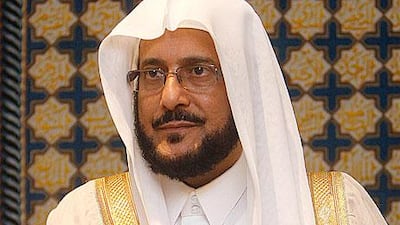RIYADH // The appointment of a moderate to head the Saudi religious police has raised hopes that a more lenient force will ease stern social constraints in the kingdom, but human rights activists remain sceptical.
Less than two weeks into his post as chief of the Commission for the Promotion of Virtue and Prevention of Vice, Sheikh Abdullatif Abdel Aziz Al Sheikh banned volunteers from serving in the commission, a move designed to curb the group's most outrageous violations.
The volunteers, usually ultraconservative and fundamentalist Muslims, have often been accused of abuse and violence against Saudis as they patrol the streets of the kingdom enforcing the strictest interpretations of Islam's social traditions.
"Even the sight of a religious police car approaching fills us with feelings of fear and horror," said Um Ibrahim, a Saudi mother, adding that since Mr Al Sheikh's appointment, "we are already seeing fewer patrols".
"We are very hopeful," she said noting that the number of messages posted by fellow citizens on social networks like Twitter, warning of abuses by the police have "almost disappeared" since Mr Al Sheikh's appointment by King Abdullah on January 13.
Mr Al Sheikh, a member of the kingdom's most powerful religious family, is known for his moderate views on segregation.
In 2010, he backed a religious police official from Mecca who said Islam does not categorically require segregation and that shops could remain open during prayer time.
The religious police prevent women from driving; require them to wear abayas; block public entertainment and force all commerce - from supermarkets to petrol stations - to come to a halt at prayer times.
They have also been responsible for outrageous abuses and behaviour. In 2002, they reportedly prevented firemen from entering an all-girls school because of the segregation-of-sexes policy and blocked girls from escaping the fire because they were not wearing veils.
Fourteen girls were trampled to death and 50 others were injured in a stampede after the fire broke out.
Since his appointment, Mr Al Sheikh has also said he plans to establish a nationwide call centre where all reported complaints regarding inappropriate social behaviour can be verified.
In the past, anonymous callers could randomly contact members of the religious police and make allegations of misbehaviour, a system that resulted in repeated false allegations and excessive responses by individual police officers.
Saudi's religious force, known as the "Mutaween", are often seen patrolling shopping malls and public spaces looking for violators of Islam's rules for social engagement.
Even a simple exchange of words with a member of the opposite sex could result in arrest.
In early January, a video circulated on YouTube showed a mother and father defending their son who was being harassed by police because his hair was too long.
Bariaa Al Zubaidi, a Saudi human rights activist, said the decision by Mr Al Sheikh to ban volunteers from the force was a step in the right direction, but cautioned that the change in leadership amounted to "changing the face" of the organisation, and not "the mentality behind it".
"We don't feel safe" with the religious police on the prowl, said Mr Al Zubaidi. "There are many terrible stories ... their behaviour has been an insult to our dignity, to our religion, and to our country."
As far as the police are concerned, "everyone is guilty until proven innocent", Mr Al Zubaidi said, noting that more serious measures must be taken to bring real change, including the creation of an entity that can prosecute and punish violators.
The Saudi activist Mohammed Al Qahtani, the president of the Saudi Civil Right's Organisation, described Mr Al Sheikh's appointment as a "cosmetic" change to the commission, arguing that the new chief can only "enforce policies decided by top officials".
In the past year, Saudi newspapers have reported heavily on the abuses by the police and are showing greater willingness to criticise the force's actions.
In one such case, Saudi dailies embarrassed the force by reporting the arrest of a young Saudi who kissed his 70-year-old mother's hand after he was released from hospital.
They also reported the arrest of a young woman who was accused of inappropriate contact with a man. She was being escorted by her uncle to a job interview.

